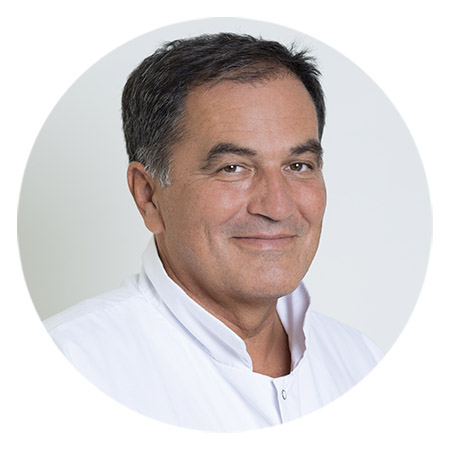The mission of the Foundation for Medical Research (FRM) is to contribute to the development of innovative and pioneering medical research in France. The foundation bestows two yearly communication prizes, the Jean Bernard Prize and the Claudine Escoffier-Lambotte Prize, respectively to scientists and journalists who make significant and qualitative contributions to the public's knowledge of life sciences.
The prize laureates are chosen by a jury of scientific and media personalities.
The Jean Bernard Prize, named after the professor who founded the FRM, honors scientists who, via the exposure of their research, contribute to increasing public knowledge on health issues.

|
This year, the FRM presented the Jean Bernard Prize to Prof. François Desgrandchamps of the François Jacob Institute of Biology (CEA). |
Prof. Desgrandchamps is a urological surgeon and chief of urology at the Saint-Louis Hospital in Paris, France. He also heads the translational immuno-onco-urology team within the Immuno-Hematology Research Unit (SRHI). That team is focused on the clinical applications of human immuno-oncological research done at SRHI, and particularly on HLA-G, a protein that serves as an essential checkpoint in immune tolerance.
Bacillus Calmette-Guérin (BCG) immunotherapy is widely used in certain types of bladder cancer, notably non-muscle-invasive bladder cancer (NMIBC). However, over the past few years, novel immunotherapeutic approaches focused on immune checkpoints have seen the day in the setting of kidney and bladder cancer to address emerging issues with immune tolerance.
Prof. Desgrandchamps's team has shown that parameters associated with HLA-G have a role in NMIBC prognostics and may identify patients at high risk of relapse. HLA-G is often expressed by tumor cells, giving them the ability to evade immunosurveillance; in other words, its presence on tumor cells is directly responsible for the immune system's inability to attack the tumors.
The translational immuno-onco-urology team develops innovative projects focused on host-tumor relationships, therapeutics, diagnostics and other clinical applications. With its studies on patient immunological profiles, the team was able to establish a new classification of bladder tumor risks, which is currently being evaluated in a European multicenter study.
Learn more about Prof. François Desgrandchamps and the other winners of 2020 FRM Prizes (document in French).
About the Foundation for Medical Research : The association that was to become the FRM was created in 1947 to bring new life to French medical research, which had been brought to a near standstill by the Second World War. Great names in medicine progressively joined the association, notably the Professors Jean Hamburger & Jean Bernard and thereafter the Nobel laureates Jean Dausset & François Jacob. A number of personalities in economics and financing also gave their support to it. In 1962, under the impetus of Dr. Escoffier Lambiotte, the association took on a new dimension and became a foundation, recognized three years later as an organization of public benefit as defined by French law.
The FRM's main missions are: i) to develop French biomedical research in all domains and at all phases within public research organisms and higher learning institutes by providing private financial support to projects selected after call for proposals, and ii) to inform the general public on issues and progress in biomedical research.